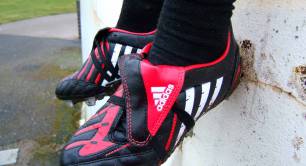How Ghana's one-man ski team inspired a social enterprise
From the snowless capital of Ghana, Accra, a young man dreaming of alpine slopes and slalom races is an oddity. Even less expected is that an ambitious dream of reaching the Winter Olympics could become a reality. But that is the story of Kwame Nkrumah-Acheampong, which Richard Harpham and Martin Desborough experienced first hand as members of the Ghanaian ski team. Now they're working to capture the drive and acheivement of great individuals like Kwame, and inspire it in others.
Inspired Life's origin story
In 2010 Ghana sent one athlete to the Vancouver Winter Olympics, Kwame Nkrumah-Acheampong, to compete in one discipline, alpine skiing. Kwame was raised in Ghana and moved to the UK in 2000, where he learned to ski on a dry ski slope in Milton Keynes at the age of 25. Ten years later he was slaloming down Whistler Mountain as Ghana’s sole Olympian at the Vancouver Winter Olympics.
Ghana’s tropical climate would explain why Ghana only entered one competitor into one event at the Winter Olympics, and earned Kwame the nickname “snow leopard”. But how Kwame ended up there is less easy to fathom. It was a feat of ambition, which mirrored the debut of the Jamaican Bob sleigh team in 1988, the inspiration for the film Cool Runnings.
Kwame may have been the man taking on Whistler Mountain but he didn’t go it alone. Richard Harpham and Martin Desborough, co-founders of social enterprise Inspired Life, were two key members of the Ghana Ski team supporting Kwame. One evening, as they sat in a cosy alpine diner warming their fingers around steaming mugs of hot cider and gazing out onto forested slopes and snow-capped peaks, they had a realisation.
Kwame’s ambition, the sort that gets you hurtling down a death-defying slope shortly after your first ski experience on real snow, beggared belief. Harpham and Desborough spoke about capturing and sharing it somehow, perhaps even cultivating it? “We knew we could do something with this,” Harpham tells me over the phone. They were determined to use Kwame’s experience to inspire people to reach previously unthinkable goals.
From napkin notes to social enterprise
On a napkin they sketched out the idea for a business that could ignite ambition in people by giving them access to the right role models and inspiration. Just as Kwame headed from dry ski slope to the Olympics, Harpham and Desborough transformed their notes on a napkin into the social enterprise Inspired Life. Now Kwame is one of several adventurers and achievers that Inspired Life uses as the core of its programmes designed to inspire people to reach their fullest potential. The people they work with now range from school children to young mums, to young offenders and people who are finding it difficult to get a job.
Inspired Life offers a range of activities, including adventure clubs, community talks and assemblies, bespoke events and its flagship programme, the Inspired Life Self-Esteem programme. It’s a four to six week confidence-building, horizon-stretching programme led by a team of three and supported by two inspirational speakers who act as role models. Arctic explorer Jim Mcneil, Jet ski racer Anya Colley, inter-continental cyclist Alastair Humphreys and wild animal trainer Grace Dickinson are just a few of the adventure seekers joining Kwame on Inspired Life’s mission to inspire others to realise their ambition and drive towards future goals.
| 149/1449 on the Growth Index |
| 7/68 for growth in the East of England |
| 22/184 for growth in the education and youth sector |
| 8/10 for impact measurement (average score across the index) |
Social mission locked in
Inspired Life is a community interest company – an important decision, Harpham says, in terms of building an authentic organisation that would hold true to its social mission. Community Interest Companies (CICS) are limited companies created for the use of people who want to run a business for community benefit and not purely for private advantage.
Harpham tells me they opted for the CIC structure because it afforded them “flexibility”. CICs are not subject to the onerous regulation that can be synonymous with registering and running a charity. They are able to have a much more commercial nature which provides relative freedom in terms of the day-to-day running of the CIC.
An “asset lock” ensures that any assets and profits are retained within the CIC and used solely for community benefit. This is something Harpham considers to be of particular importance. “We behave more like a charity in this sense,” he says, and Inspired Life strives to use over three-quarters of all funding for the direct delivery of Inspired Life projects.
Inspired Life’s direct use of funding is made possible through the immense amount of time gifted to the organisation by volunteers and employees – around 4,000 hours each year. Harpham is the only full-time employee and works alongside three part-time members of the senior team and 20 part-time employees that work to deliver Inspired Life’s programmes.
Revenue and sustainability
The social business generates income by delivering projects for organisations on a contract basis and running programmes in schools. It supplements this by applying for local grants. It is currently delivering on two major contracts Harpham says – one for Milton Keynes Community Foundation and another worth £25,000 for the European Social Fund.
The European Social Fund (ESF) is the European Union's main financial instrument for supporting employment in the member states of the European Union as well as promoting economic and social cohesion. Inspired Life took on the £25k contract by partnering with the Learning Partnership, an organisation which works as “an honest broker” supporting other organisations to deliver new and innovative learning opportunities.
On the ESF contract Inspired life is running programmes for people who find it particularly difficult to find work or are at risk of falling out of education, which might include young offenders, as well as people suffering from depression, and dealing with learning difficulties such as autism.
Social impact
Inspired Life takes “a number of different approaches to measuring social impact and uses a ‘before and after’ feedback process,” Harpham says.
Statistics from the website show that 100% of participants felt inspired to set goals and targets and to begin thinking about opportunities in their lives. Another statistic highlighted, based on an NHS evidence based model of measurement, determines that the self-esteem programme delivered a 23% improvement in wellbeing.
Zooming in on how individuals benefit from particular programmes, the team also designs ‘destination progression routes’ to monitor individual progress. Inspired Life’s attention to impact has earned it an 8/10 score on the RBS SE 100 Index, the UK’s social enterprise index.
If you weren’t passionate you wouldn’t bother. I’m doing it because I believe in what we do and the need for it is massive.
Growth and ambition
Growing a social enterprise is no mean feat. “It’s a tough marketplace to operate in,” Harpham tells me. “If you weren’t passionate you wouldn’t bother. I’m doing it because I believe in what we do and the need for it is massive."
The future trajectory of Inspired Life is a mix between Harpham’s "let’s change the world attitude” and his wife’s “let’s focus on what’s achievable without running ourselves into the ground,” he says.
Inspired Life is currently based in Bedfordshire, and has delivered programmes in Westminster and in Cambridge. Harpham's goal is to expand and operate in the four counties of Bedfordshire, Buckinghamshire, Hertfordshire and Cambridgeshire. Though ambitious about scale, he’s happy running “a stable quarter of a million pound turnover business” he says. In many ways the mindset of Ghana's "snow leopard" mirrors that of the ambitious social enterprise founder faced with a challenging marketplace, "No problem; choo, choo, I'm the train which never stops."



